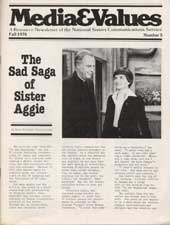Are We Afraid of Media Technology?
|
This article originally appeared in Issue# 5
|
In an impassioned plea to Catholic educators recently, Father Al McBride urged us to "convert the Jordan to ~ to use modern communications technology to share Gospel values.
This same spirit permeated a Symposium on Catholic Education that met a few years ago in San Francisco to chart new leadership guidelines in the light of the Greeley study. Participants rated media use ( and shared responsibility) at the very top of their priorities. I'll never forget the exhilaration I felt at the Symposium when I saw colleagues almost unanimously endorse this media proposal.
And yet…
Once stated, a sort of uneasiness seems to set in. We should probably admit it openly; we are afraid of media technology.
My comments here, in response, are a plea to Catholic educators to beware of a kind of technological "ghetto mentality," an outlook which says "mass media are evil; let's retreat from them."
Along with modern modes of transporation, some TV content does pollute the environment. But we continue to use airplanes and automobiles. Indeed, these modern travel tools help us in our educational efforts. So while we lobby energeticafly to clean up our airwaves, we must begin a pilgrimage along these new electronic highways. That's where humanity is.
So much for my plea. What about the practicalities? First some questions; then some answers. Must we, as Catholics, compete with mass media? Not necessarily. Often cooperation is called for, not competition. Educators can use many fine network specials to teach. Examples include "Brian's Song" and "The Autobiography of Miss Jane Pittman," but many others could be cited. There is no need, therefore, to concentrate exclusively on developing "our own" programs.
Another question. Must technology always be impersonal? Heavens, no'. Technology can aid intimacy. One of the best tools for intimate communication is a technological one--the telephone.
Do media manipulate? Of course they do. All the more reason for us to get involved.
Our pro-life apostolate should include sensitivity to how media manipulate humankind. How can we protect ourselves and others from this manipulation if we don't have the data? We must be media-aware. Running away is simply surrender.
Enough questions. Is there a solution to our general uneasiness about media? Here are some suggestions:
- Expand the existing communications agencies that are within the Church.
- Use newer, less expensive, technologies, such as cable TV, videocassette, and others.
- Develop a national media library and distribution system for religious education materials (including ecumenical resources).
- Encourage media use in parishes.
- Educate the Christian community to evaluate commercial television in the light of Christian values.
I also add the following advice-the benefit of being buffeted about in the media world for more than a decade. Don't be intimidated by the media mystique. Some media people like to confound others; media knowledge represents power. But this power belongs to the people, not to an elite group. Learn about media. Do your own media thing.
Let's enlist the aid of our students. Many a teacher who is undone by a movie projector has been wise enough to have students as "media coordinators" in the classes. They know how to handle the equipment. Often they can even repair it. Let them do it. Encourage them to create their own productions.
Let's eliminate the term "audio-visual aid" from out vocabulary. Media are at the very core of learning systems today; they're not "extras." Encourage visual literacy programs in our schools. This doesn't mean that we downgrade reading books. We must be aware, though, that people also "read" visually. A vigorous national communications thrust is needed in the Church. However, grass roots media use is vital.



